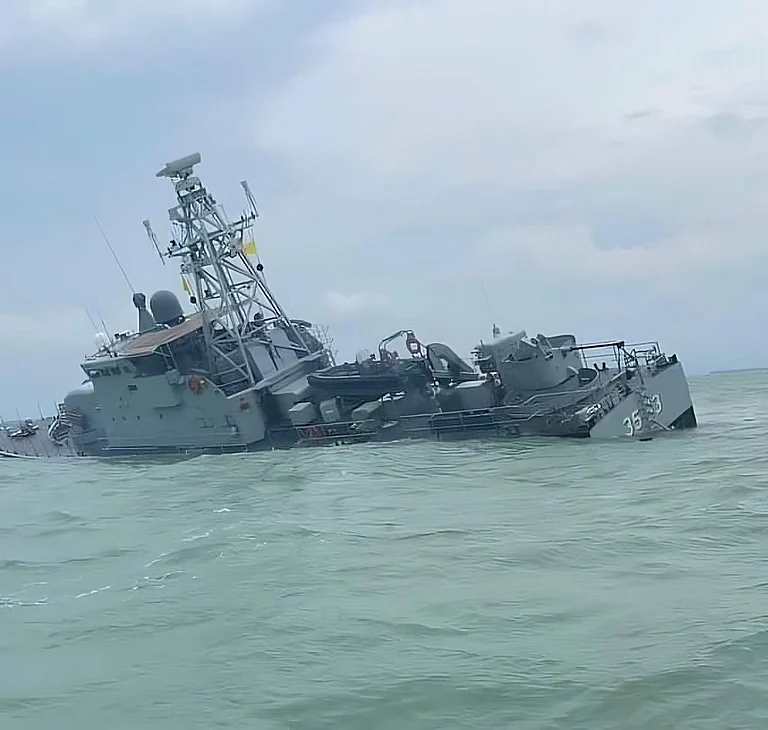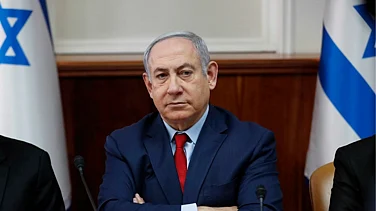The new Cold War had been projected as a rivalry between the US and China. On 24 February 2022, when Russia invaded Ukraine, it became clear that Russia, not China, would in fact reclaim the Soviet Cold War mantle. Russian and Chinese interests overlap substantially enough that their entente could also jointly undermine American hegemony, yet this possibility is debatable in light of the Ukraine crisis because of claims that support in China for the invasion could easily be overstated. International Relations theorists and critics of foreign policy have variously found both Putin and NATO expansion responsible for this crisis and its escalation, with potential consequences for Europe and the rest of the world. The EU has taken a variety of measures condemning Russian actions with sanctions, diplomatic measures and restrictions on economic cooperation, individual asset freezes and travel restrictions. But it is unclear what the response of the rest of the world is. Individual nations have voted for, against or in abstention on UN resolutions pertaining to the Ukraine crisis but if we are indulging broad stroke Cold War analogies, then where are the non-aligned nations, and what is their response to the present crisis?
Who are the non-aligned?
The Non-Aligned Movement (NAM), currently has a membership of 120 states, most of whom are also members of the United Nations. This is a large grouping of states, second only to the United Nations, and has expanded beyond Asia and Africa to a global membership. The NAM also confers Observer status on non-member nations, and currently hosts Russia and China in that capacity. What are its origins?
The year 1945 saw the end of the World War II, the beginning of the Cold War, and the founding of the United Nations. This postwar period was relatively peaceful in Europe as the US and the Soviet Union were not in direct confrontation with each other but also because Asia and Africa absorbed a disproportionate burden of these historical events. Asians and African soldiers had fought in the World War II and post-1945, superpower rivalry had been carried out on Asian and African territories, but through the 1950s and 1960s, the UN was gradually becoming a platform for the diplomacy of Asian and African nations. Asian and African nations formed solidarities within and outside of the UN that inaugurated a new wave of internationalism. Afro-Asian coalitions offered a new way of thinking about world politics by rejecting imperialism in all its forms –petitioning for the sovereignty of their own people and other colonial subjects, non-aligned nations organised around becoming a check and balance against great power competition at the UN. Over the next few years, the movement had some successes and many failures but bringing Asia and Africa to the high politics table was arguably its biggest accomplishment (this increasingly included other parts of the developing world including countries from South America and Oceania).
The possibility of this anti-imperialist, race-inclusive, progressive politics was first celebrated at an Asian-African conference at Bandung, Indonesia in 1955. The legacy of the conference, the embodiment of the aspirations of the 29 attending countries is the Bandung Spirit, a declaration endorsing non-aggression, equality, sovereignty. Bandung internationalism represents one of the most audacious attempts at rebuilding the post-war system of states into an invigorated space with a radical vision of a political future. This idea of the international included non-alignment, and indeed, many of the delegations attending the Bandung Conference were of non-aligned nations – these were nations that had not participated in security pacts or alliances with either the US or the Soviet Union. After Bandung, a series of other diplomatic moves resulted in the founding of the Non-Aligned Movement, the institutionalised form of the non-aligned approach to Cold War politics. Along with Yugoslavia, Egypt, Ghana and Indonesia, India was one of the most prominent advocates of this approach to world affairs and Jawaharlal Nehru, who first articulated this concept in the Indian context, was a vocal proponent of non-alignment as a form of cooperative security amongst its members and with non-members too.
Why is non-aligned politics critical to the crisis in Ukraine?
Non-aligned states have often gone to war against one another, and by no means are nation-states without a historical record of engaging in conflict. Being non-aligned does not preclude the possibility of going to war, nor does it offer any guarantees against having war waged upon oneself. Yet, the NAM is also more than a sum of its parts – it represents an internationalist political vision, which amongst its many objectives emphasizes sovereignty and self-determination. These ideals form the kernel of Ukraine’s response to this invasion. Moreover, as Ukraine was not a member either of NATO or of the Warsaw Pact, and maintained neutrality, even though it was not non-aligned itself, non-aligned nations would do well to mount a critique of this infringement of Ukrainian sovereignty. At its inception in the 1940s, non-alignment was envisioned as avoiding alignment with either of the two Cold War camps, but also as a policy that sought decolonisation, aided developing countries prioritise economic growth and social cohesion and did so by offering support to members, and agitating against both forms of imperialism – the older form that drove territorial colonization and newer forms that were built on economic exploitation. At its core, non-alignment was active resistance to ideological politics, both communist and capitalist, and also to American and Soviet expansionism, which was viewed as inherently imperialist.
This perspective on world politics took a decisive shift in 1991 after the Soviet Union collapsed and the world entered a period of American dominance. For a while after 1991, non-alignment was touted as having died a natural death – if there were no two camps, there was no question of aligning with either and hence no possibility of not aligning with either. Yet, non-alignment persisted in world politics as a force against the economic ruination or political subjugation of developing countries. For the non-aligned nations that had constituted the Third World in the Cold War era, the decline of the USSR pivoted politics even more towards economic stability and self-reliance. In the last three decades, the non-aligned nations have asked for reform of the UN Security Council, have critiqued US foreign policy including the wars in Iraq and Afghanistan and have bolstered the demands for self-determination of people’s and independence movements. In these ways, the non-aligned have interrogated Euro-Atlantic aspirations to a Pax Americana and the idea that there would be a long and sustained peace under American dominance of the world system. At the height of Cold War politics, the non-aligned were a subaltern counterforce in world politics, but have since, engaged with the international community in primarily economic terms, with a focus on socio-economic reform.
The Russian invasion of Ukraine has somewhat disturbed this progressivist line of non-aligned political thought and could revive the era of non-aligned radicalism. Indeed, if non-aligned politics is to develop new modes of anti-imperialist critique going forward, non-aligned nations have no choice but to advocate for Ukraine’s right to self-determination, and particularly for negotiations on Ukrainian neutrality. Russian denial of Ukrainian voices speaking their own histories of oppression and trauma in the Soviet space is a colonial move. Similarly, and especially in the Eastern European context, American internationalism minimises democracy, pluralism and freedom when it doesn’t fit a circumscribed European or Western mould. Non-aligned politics has a legacy of provincializing both Russian and American narratives. It must extend its active support to post-Soviet actors. Because of the manner in which the non-aligned are organised – they are geographically, racially and economically diverse – they will not be speaking in defence of Ukraine’s sovereignty in pursuit of any fixed larger objective but instead, would support Ukrainian sovereignty as the goal in and of itself because it affirms the notion of justice.
For the contours of this resistance, It both matters and doesn’t matter that this war is being fought in Ukraine. It matters because Ukraine is in Europe and thus the wreckage caused by this war is much more visible than similar crises in Syria, Yemen, Afghanistan due to a racialized hierarchy of suffering. Its European location brings the rivalry between Russia and the US to the foreground of this crisis in a way that is not comparable to other contexts. This rivalry is also cast in a Cold War formulation, creating alignments between Russia and China against US-led NATO. This presents a case for non-aligned nations to reassert their normative commitment to a reformed world order from a third perch. It doesn’t matter that this war is being fought in the Ukraine because no matter the site of violence, the character of war is so transformative that it reverberates through the system of states. International politics is never the same as it was before or during the war. War reveals what diplomacy hides – because war germinates from within ‘normal’ politics, it exposes the fissures in everyday politics, and the weaknesses of the world order that are acutely and excessively experienced by developing nations. As non-aligned nations are predominantly also developing nations, they can speak to these ruptures in a peaceful world order presently on gruesome display in Ukraine.
How is non-aligned politics failing?
Despite the Ukraine crisis presenting prime conditions for an attack on great power politics, the withering criticisms of great power militarism mounted in the 1940s, 50s, 60s by Asian and African states are not being replicated today because non-aligned politics has shrunk to its most atrophied form – it has become a foreign policy. As policy, non-alignment is put through the litmus test of whether or not it serves a state’s national interest. This narrows the scope of non-aligned politics to the strategic dimensions of an individual state’s survival and rise in the system of states. Any foreign policy that is primarily strategic is entrenched in militarist thinking – the end goal of strategy is triumph on the battlefield – even if that battlefield has looked in recent years like the UN Security Council. In this mode of conducting its foreign affairs, the moral identity of a nation is subsumed into its national interest – a departure from the mid-twentieth century when the identity question drove the interests of newly independent nations. The internationalist politics of that time was predicated on the belief that while national interests were singular and unique, identities, such as the Afro-Asian one, could be shaped collaboratively.
For non-aligned nations, it has proven to be disastrous that national foreign policies have become disjointed from collaborative world politics. During the Cold War, non-aligned states functioned in two capacities – the first was acting in their national interest; the second was in deference to shared political ambitions that rose much beyond their individual capacities or goals, ironically often leading to the criticism that they were punching above their weight. From the early Cold War era to now, the distance between those two paths has widened considerably. Therefore, what we’re seeing now, with India, for instance, is the performance of India’s non-aligned foreign policy (call it strategic autonomy or multi-alignment) but simultaneously, the abandonment of more wide-ranging non-aligned politics (a process by which postcolonial states collectively offer a critique of power politics as means of making war less likely). At present, India’s foreign policy is predicated on the belief that a multi-polar world is one that is in India’s interest, so ensuring that outcome is seen as the primary goal of its non-alignment. In Cold War non-aligned thinking, there was also additionally a wide-ranging conceptualisation of critical political action.
In an unlikely succession to that older version of non-alignment, Ukrainian President Zelenskyy has demonstrated what that kind of politics could look like – in a recent televised statement, Zelenskyy asked Russian soldiers to surrender so they may be treated as people ought to be treated. By humanising the war-waging soldier, Zelenskyy displayed decolonial thinking in resisting the logic of imperial power that dehumanises the people of the territory it occupies but also its own people by sending them into war. Zelenskyy’s government is defending the nation but is also interested in more than just triumph at war. By offering support to Russian soldiers if they surrendered and expressing solidarity with Russian anti-war activists (who he also thanked in the telecast), Zelenskyy is widening the scope of the Ukrainian response beyond the rules of war, into the shockingly radical realm of peace. Putin used the narrative of ‘peacekeeping’ to march into Ukraine’s breakaway regions; Zelenskyy is using the language of ‘peacemaking’ to counter.
Non-aligned nations have a history with participating in both processes successfully. Yet, they have time and again awkwardly grappled with how to reconcile their foreign policy objectives with their loftier political goals. They have been particularly divided over Russian aggression, possibly due to misplaced nostalgia for Russia’s own anti-imperialist past. In Hungary in 1956, in Czechoslovakia in 1968, in Afghanistan in 1979 and more recently in Crimea in 2014, non-aligned nations were unable to present a fresh paradigm that could have now been useful in thinking about Russia’s war in Ukraine. In the past, non-aligned politics has upended Cold War spheres of influence, disrupting ways in which conflict played out, was mediated, culminating in negotiated stalemates. As Ukraine refuses to surrender besieged territories to an invading force, will this prompt a non-aligned position that the wars in Iraq or Afghanistan did not? The question is – will non-aligned nations overthrow their depleted worldview, and reprise a sophisticated critique of imperialism? If the state of war we’re in provides the occasion for such a subversion, their own history just might provide the provocation.

















